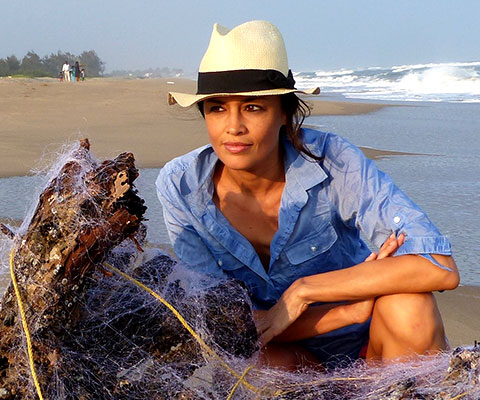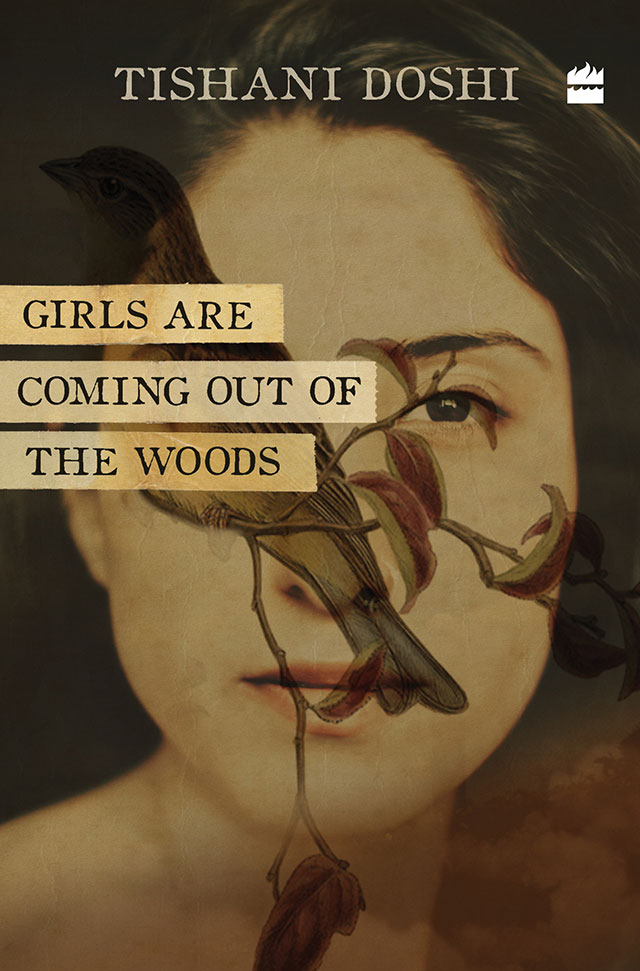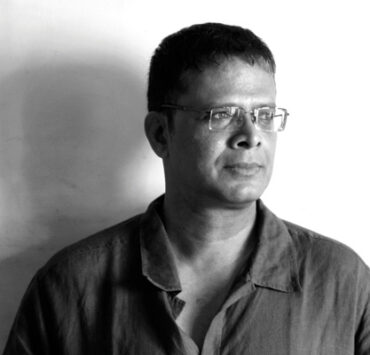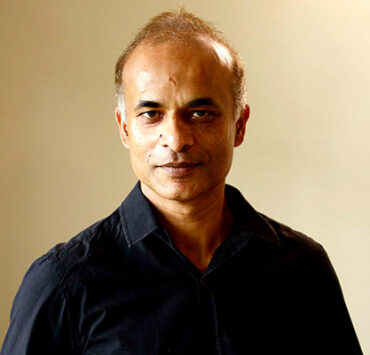Girls Are Coming Out of the Woods, Tishani Doshi’s latest collection of poetry, is polyphonic in its concerns. Her poems address mortality, love, identity, and loss, as much as they address gender roles and the terrible violence that these roles enable, as much as they address the redemptive powers of poetry.
In the most complex of these poems, many of these themes converge powerfully, like waves crashing against the shore at high tide. In the most direct of the poems, Doshi can be searing, steadfastly honest, and achingly vulnerable in turn — ‘bold as roses’, as the R. S. Thomas poem she quotes in her epigraph says.
In a recent conversation with Helter Skelter, Doshi spoke about her new book and expanded on some of the impulses behind her work.
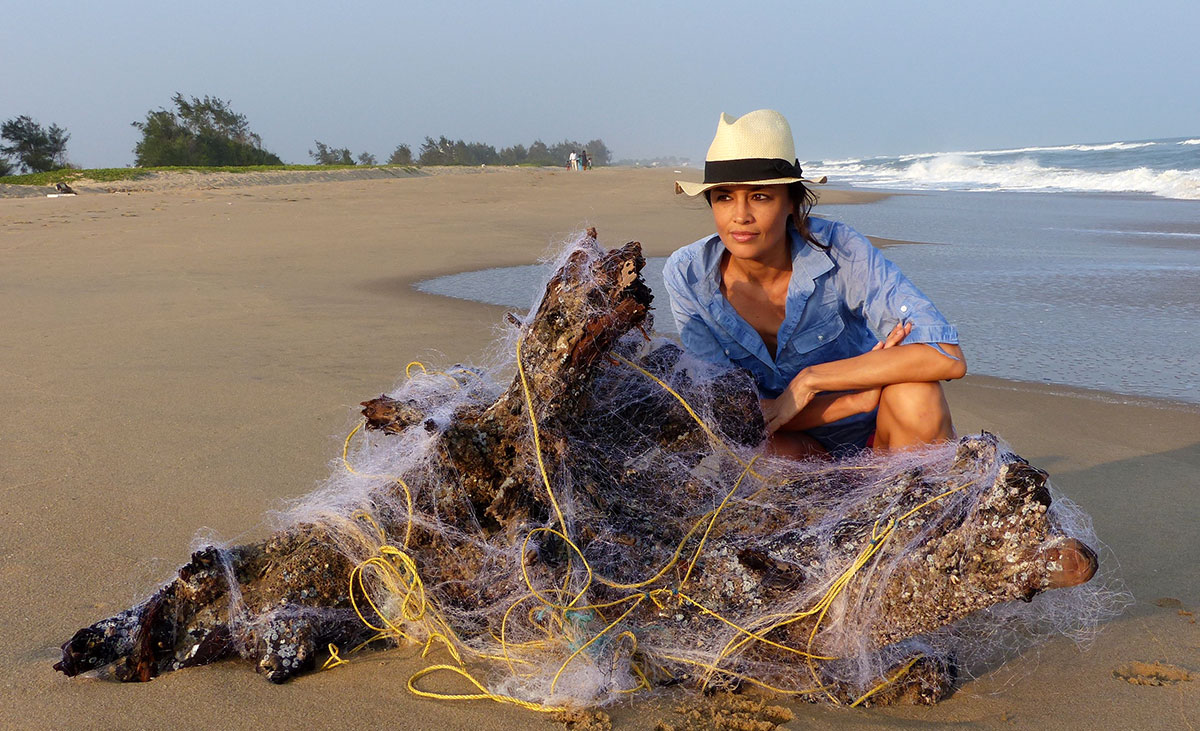
“In this time of great connection, it has become harder to connect.” Photograph by Carlo Pizzati.
Many of the poems in Girls Are Coming Out of the Woods address the necessity of the poet — even when you’re being tongue-in-cheek about poets, you’re always writing a love song to them too. With this collection, how has your understanding of your own role as a poet shifted? In today’s world, what is the poet’s responsibility?
It’s something I ask a lot. What’s the point of poetry? Why bother with it? I never think of responsibility and poetry as words that go together because historically poets have been highly irresponsible people — but I do feel that in this time of great noise it has become harder to hear. In this time of great connection, it has become harder to connect.
So, poetry could be the instance that leads us to a quiet centre that holds something up to the light, even if it’s momentary. There is something about the distillation that poetry does, which could offer us an alternative vision. But there’s that old saying about the horse — you can take it to the water, but… So, how to get people to listen to poetry? To believe as surely every poet does, that poetry can change your life? To reconcile the fact that for a lot of people, poetry is what dead people did?
The apparitions of women who have been murdered appear in the titular poem, but also in ‘Everyone Loves a Dead Girl’ and an older poem, ‘The River of Girls’. It’s an active kind of haunting: you are giving these characters voices and agency in death where they may have been given very little in life. Elsewhere, you also ask questions about the men who attack them. Can you tell us a little more about this haunting?
Part of inhabiting the haunting is trying to understand what motivates the violence. Where’s it coming from? Rather than just looking at the act itself, the poem tries to attempt a bridge between the two — not for any kind of reconciliation or empathy. No. I write from a place of anger and hopelessness because, look at the news. Today, it’s Gauri Lankesh. But for every second of every day there is a stifling, if not in this country, then in another.
And these acts are condemned as horrific and animalistic, when in fact animals don’t do this kind of thing to each other. They kill to eat. They don’t revel in torture. So this violence is coded into the very fact of us being human, and rather than look at it as an anomaly we should be looking at it as a part of what we are. What poetry can offer in all this is a way to hold the haunting, to give the dead a voice, or at least, an echo.
You are very much a poet of place; so many of your poems are rooted in the landscape of Tamil Nadu and particularly explore what it is to live by the sea. And so many of these poems explore desire, and death. What has living next to the sea taught you about life?
That everything dies. That paradise can quickly turn into a kind of hell. That the smallness of our lives is so small as to be alarming. That everything is always changing. Until it’s not.
In many of your poems through the years, including this collection, you’ve rejected traditional ideas of what being in the world as a woman should be like. You’ve talked about meeting the legendary dancer Chandralekha at age 26; how that forever changed your ideas of yourself, and paraphrasing from your essay in Shaping the World, of politics and sexuality. Can you speak a little more of this relationship, and how it continues to inform both your politics and your writing?
It’s strange how some women need permission to move away from the path and others blaze into the wilderness making paths of their own. I was one who needed a nudge, I think. It’s impossible to conjecture about the direction of your life, should this or that event not have happened, but in the case of Chandra, I feel, of course, it was inevitable.
Now the whole thing is relegated to an area of memory, which is distressing for me. It’s been almost 11 years now since she died, and the years we had together are barely half that. It all feels wispy and sepia-toned, and I find myself hungry for stories of her, to hear her voice again, to drape her saris around my body, because she’s vanishing in some way, being overwritten by life.
So I repeat the things she said to me as mantras, but really what I long for is to cycle down to the theatre and spend a few hours there with her, talking about meaningless things like the smell of kadambam flowers or the scent of malgoas or some funny story about Bhupen Khakhar or which station it is that you find the most delicious raw cashews with husks. You see what I’m saying? None of this has to do with politics and sexuality, or does it?
Some poems in Girls approach romantic love differently from some of your older poems. They look at the things we’re taught about love versus what we discover later (‘Ode to Patrick Swayze’) or explore what it means for a lover to age and eventually die (‘Love in the Time of Autolysis’). Can you tell us a little more about this shift — if indeed you agree that there is one?
My love poems have always been somewhat severe, highlighting love lost or about to be lost, and I think the nature of love is such that even when we’re in love we understand that it’s because we’ve arrived here from some other failed thing. So there’s tenuousness, always, no matter how eternal the promise.
Teenaged love is different because it’s the first time, and Patrick Swayze for me was this real, tangible, I might-meet-him-in-an-airport-one-day person, who existed in the way that the famous can exist for teenagers.
Many years later when I read that he had died of pancreatic cancer I grieved in a way you do for these figures, and I believe that kind of love counts too, even though it’s entirely one-sided, because in some ways love is selfish — it’s about your feelings, your yearning, it’s an exploration of what is being done to you by this other person. I don’t know if there has been a shift, really, because I’ve always put love in the centre, no matter how flawed.
Your titular poem has the quality of a fable, and many others have used figures from art, and from myth and folklore. What do contemporary poets owe to these oldest stories, these archetypes, and why are they important to you?
I think poets have an affinity for the past, because in the past poetry was important, so it’s natural to feel wistful for a time when poets were central to the conversation. That has faded, rather, but I think it’s inevitable to take from myths and folklore, simply because the things we were obsessed with in the past — birthing and love and god and fear and death — are all that remains.
So, walking through the Museum of Anthropology in Xalapa, Mexico, for instance, and looking at those Olmec heads and snake-skinned goddesses, or looking at Giacometti’s elongated walking women, or the wide, lush Harappan terra-cottas — it’s very natural to draw a line between all of that and try to construct a conversation around it, particularly around the female form.
You are part of this conversation, and because the body is so central to me, I suppose it’s primarily through sculpture that I make these connections. Also, isn’t there something wonderful about the fact that, from the beginning, we have found ways to celebrate our existence, whether it’s cave paintings or song? We’re still doing that, celebrating our existence, despite all the crumbling and failing.
In ‘Fear Management’ — a phrase you’ve also used in the past to talk about why you write — you address a recurring theme, that of our collective mortality and often your own death. In poems such as ‘Meeting Elizabeth Bishop in Madras’ you connect this deep awareness of mortality to the other great theme in this book, systemic violence against women. Again and again, these themes come together: the ways in which women are assaulted and killed, the fact that we must all die, and the act of reclamation that is poetry. Can you talk a little more about these connections?
In Bishop’s great poem, ‘In the Waiting Room’, she contends that it is through pain — the sound of her aunt screaming in the dentist’s chair, that connects her to her aunt, that connects her to the women with the ‘awful hanging breasts’ in the National Geographic, and to the war outside. The idea that pain can connect is important. I wrote this poem after a visit to the dentist where I took an X-ray (a horrifying, portentous death image, if ever!), and I thought how we have removed so much pain from the dentist’s chair.
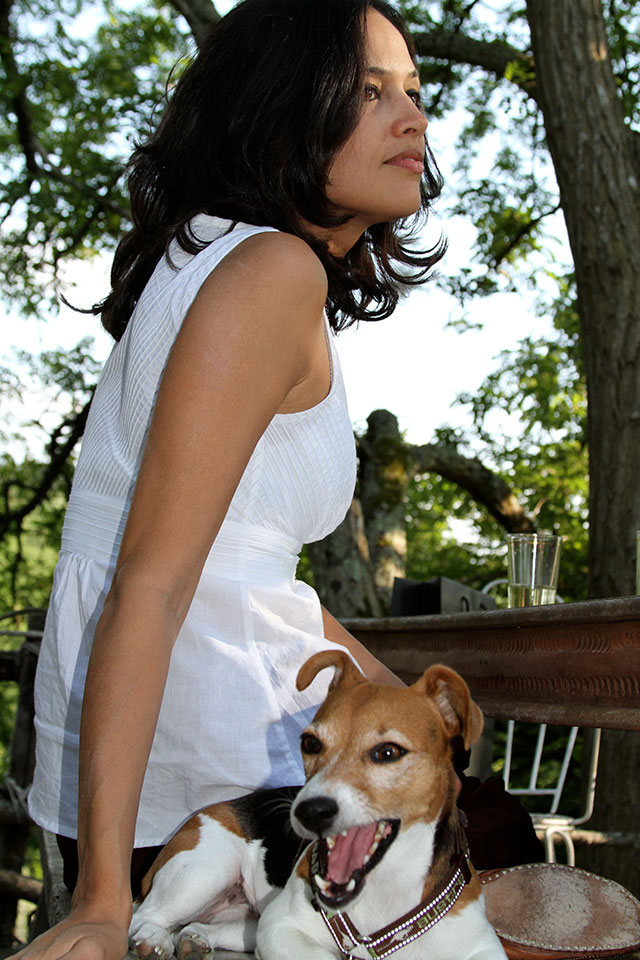
“Milan Kundera said dogs were our link to paradise, and I believe it.” Photograph by Carlo Pizzati.
All that lidocaine sends us to a happy place. And so if we can’t hear someone’s pain, how do we empathise? With the huge pharmaceutical business of pain numbing now, has it affected the way we deal with loss? So if you then juxtapose against this the stories of violence — girls hanging from a mango tree, all the rapes and killings, all the aborted fetuses, how do we connect inside to outside, what’s your loss to another’s loss?
In that sense, poetry is a kind of reclamation. I see it as this wave heading for the shore. The poem is the blob of foam that’s trying to neck above the wave. You know it’s going to crash, and that the crash is a kind of death. You know this will keep happening and happening, but there’s understanding, for a moment, there’s meaning. And so you neck and neck and neck.
Dogs are a constant, sweet (and sometimes bittersweet) presence in your poems about home. What has the companionship of dogs given you?
Milan Kundera said dogs were our link to paradise, and I believe it. It’s curious how I became this person. We had a boxer when I was a teenager, and I loved her, but that love didn’t necessarily extend to other dogs. It’s only when I began living by the beach, and I got adopted by one dog, and he slowly built a kingdom, that I become somewhat obsessive. And now, basically, if I encounter a dog, any dog, I get all oozy gushy mush mush.
I think also, because my husband and I don’t see people for days, we project all kinds of stories and narratives onto the dogs, and it’s when we start spiraling into what we call manic dog talk that we think, maybe it’s time to go to the city for a few days.
Some of the poems are about family and often therefore also about identity. For example, in ‘Grandmothers Abroad’, you exhort the protagonist: “Granny, don’t become that omnipresent migrant woman, stripped of all her memories.”
And yet you yourself reject fixed identities: in ‘Your Body Language Is Not Indian! or Where I Am Snubbed at a Cocktail Party by a Bharatnatyam Dancer’, you say —
But I bowed out of the race, said thanks, but no,
to History and Biology. I decline the invitation
to breed.
What can you tell us about this tension between belonging and charting new paths?
For a long time, I felt, because of my mixed-race heritage, that there was ambiguity about what I essentially was. That I felt short. The edges were not clear. Even though I told myself later that this mixed-upness was a good thing, a freeing thing, it doesn’t go away.
I think we all carry our identities quite heavily around with us, and I feel we should break them. I read somewhere that every seven years every cell in our body is replaced, so we essentially become new human beings, and even if it’s not true I like the idea of it, because while identity is important, it is also a kind of cage that fixes upon us.
And so now my identity is that I’m this half-Welsh half-Indian poet-dancer who lives on a beach in Tamil Nadu and loves dogs. I can’t get out of it. I’m always torn between belonging and breaking that belonging, because I think it’s always in the unknowing, the fetch, where discoveries are made.
———
Click here to purchase a copy of Girls Are Coming Out of the Woods.




